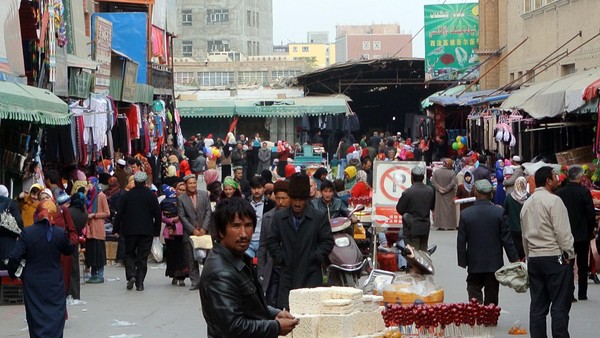Chinese authorities in the restive western region of Xinjiang have begun offering large cash incentives for interracial marriages in the latest attempt to quell growing unrest among the mainly Muslim Uighur ethnic group that inhabit the region.
The policy, celebrated by local Communist party officials as advancing the “great cause of assimilation” and “ethnic unity”, offers couples entering into mixed marriages an annual bonus of Rmb10,000 ($1,600), equivalent to 135 per cent of average annual rural incomes.
Uighurs, Mongolians and other ethnic minorities who marry people from the dominant Han race, which makes up more than 90 per cent of China’s 1.36bn population, will also be eligible for a broad range of medical, schooling and housing benefits.
The policy has been introduced in sparsely populated Cherchen County in south Xinjiang as part of the government’s response to a wave of recent bombings and terrorist attacks in the region, according to local officials and an online announcement from the local government.
“Cherchen County has a lot of minorities with their own religious beliefs but through Han-minority mixed marriages we can strengthen ethnic unity,” an official from the Cherchen County propaganda office told the Financial Times.
In the wake of several terrorist attacks across China, most of them in Xinjiang itself, Beijing has vowed to crush Uighur “separatists” and “religious extremists”.
In the latest serious incident, 96 people were killed in riots near Kashgar in late July after a “gang” of Uighurs attacked a police station and government offices, according to Chinese state media.
Security services in the region have stepped up arrests and executions of alleged terrorists in recent months, but some local governments have also experimented with economic incentives to address simmering resentment.
“The central government has recently been calling for greater inter-ethnic ‘mingling’ in Xinjiang and these latest policies [in Cherchen] appear to be a response to that,” said James Leibold, an expert on China’s ethnic policy at Australia’s La Trobe University.
Similar cash incentives have been offered in Tibetan regions, where resentment towards heavy handed Chinese rule has also been rising.
The government has long been concerned about the low rate of interracial marriage between Uighurs and Han, which it sees as an obstacle to solidifying Chinese rule in the vast border territory.
In 2000, the last year the government published official figures, only 1.05 per cent of Uighurs lived in mixed-race families, compared with 7.71 per cent for Tibetans and a national average of 3.2 per cent, according to Mr Leibold.
Under the new policy in Cherchen, couples living in mixed marriages will be eligible for up to Rmb20,000 in medical expenses paid by the state and their children will get up to Rmb5,000 a year once they are accepted to study at a Chinese school.
That is on top of the Rmb10,000 annual bonus they can receive for up to five years.
The average annual income for rural residents in Xinjiang in 2013 was just Rmb7,394.

Leave a Reply